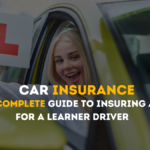Introduction
Attention all new drivers! Are you ready to hit the road with confidence? Whether you’re a teenager getting behind the wheel for the first time or an adult learning to drive later in life, having the right car insurance is essential. But with so many options out there, choosing the right coverage can be overwhelming.
That’s where this Ultimate Guide to Learners Car Insurance comes in. In this comprehensive guide, we’ll break down everything you need to know about learner’s car insurance, from the basics of coverage to tips for finding the best policy for your needs. We’ll explore the different types of insurance available, provide insight into what affects your rates, and offer practical advice for saving money on premiums.
We understand the unique challenges beginners face when it comes to car insurance, and our goal is to arm you with the knowledge and tools you need to make informed decisions. So, whether you’re studying for your driving test or ready to start your journey on the open road, let’s dive in and learn all about learners car insurance.
Why learner’s car insurance is important
As a new driver, having the right car insurance coverage is crucial for your safety and financial well-being. Learner’s car insurance is designed specifically for individuals who are in the process of obtaining their driver’s license, whether they are teenagers or adults. This type of insurance provides essential protection against the risks and uncertainties that come with being a beginner behind the wheel.
One of the primary reasons why learners car insurance is so important is the increased risk associated with inexperienced drivers. New drivers are more likely to be involved in accidents due to their lack of driving experience, which can lead to significant financial consequences. Without proper insurance coverage, the costs of medical expenses, vehicle repairs, and liability claims can quickly add up, potentially causing a financial burden that could be difficult to manage, especially for young or low-income individuals.
Furthermore, in many countries, it is a legal requirement for all drivers, including learners, to have a valid car insurance policy. Driving without insurance can result in hefty fines, license suspension, and even criminal charges. By obtaining learners car insurance, you can ensure that you are complying with the law and protecting yourself and others on the road. This not only provides peace of mind but also helps to maintain a clean driving record, which can positively impact your insurance rates and future driving opportunities.
Requirements for getting learners’ car insurance
The specific requirements for obtaining learners car insurance can vary depending on the insurance provider and the region in which you reside. However, there are some common elements that are generally required across the board.
First and foremost, you will need to provide proof that you are a learner driver, which typically involves presenting a valid learner’s permit or license. This document demonstrates that you are actively in the process of learning to drive and have not yet obtained a full driver’s license.
In addition to the learner’s permit or license, you may also be required to provide other personal information, such as your age, address, and driving history (if applicable). Some insurers may also request information about the vehicle you will be driving, including the make, model, and year.
Another important requirement for learners car insurance is the presence of a licensed, experienced driver who will be accompanying you during your driving lessons or practice sessions. This individual, often referred to as a “supervising driver,” must be of a certain age (typically 25 or older) and have held a valid driver’s license for a specified period of time (usually at least 3-5 years). The supervising driver’s information will also need to be provided to the insurance company.
It’s worth noting that the specific requirements for learners car insurance can vary widely across different insurance providers and jurisdictions. It’s essential to thoroughly research and understand the specific requirements in your area before applying for a policy. This will help ensure that you are able to obtain the necessary coverage and avoid any potential issues or delays in the process.
Types of coverage offered by learners’ car insurance
Learners’ car insurance policies typically offer a range of coverage options designed to meet the unique needs of individuals who are in the process of obtaining their driver’s license. While the specific types of coverage may vary from one insurer to another, there are some common elements that are often included in these policies.
One of the most essential types of coverage is liability insurance. This coverage protects you in the event that you are involved in an accident and found to be at fault. Liability insurance can help cover the costs of any damage or injuries sustained by the other party, as well as any legal fees or settlements that may arise. This type of coverage is often required by law in many jurisdictions.
Another common type of coverage offered by learners car insurance is collision coverage. This coverage can help pay for the repair or replacement of your vehicle if it is damaged in an accident, regardless of who is at fault. This can be particularly important for learner drivers, who may be more prone to accidents due to their inexperience.
In addition to liability and collision coverage, some learners car insurance policies may also include comprehensive coverage. This type of coverage can help protect your vehicle from non-accident-related damages, such as theft, vandalism, or natural disasters. This can provide an additional layer of protection for your vehicle and give you peace of mind as you navigate the learning process.
It’s important to note that the specific coverage options and limits offered by learners car insurance policies can vary significantly between different insurers. It’s crucial to carefully review and compare the available options to ensure that you are getting the coverage that best suits your needs and budget. Additionally, some insurers may offer additional add-on coverages or discounts for learner drivers, so it’s worth exploring these options as well.
How to choose the right learner car insurance policy
Choosing the right learners car insurance policy can be a daunting task, especially with the wide range of options available in the market. However, by considering a few key factors, you can ensure that you find a policy that provides the coverage you need at a price you can afford.
One of the first things to consider is the level of coverage you require. As mentioned earlier, liability insurance is often a legal requirement, but you may also want to consider additional coverage such as collision and comprehensive. Evaluate your specific needs and the potential risks you may face as a learner driver to determine the appropriate level of coverage.
Another important factor to consider is the cost of the policy. Learners car insurance premiums can vary significantly based on factors such as your age, driving experience, the type of vehicle you’ll be driving, and your location. Shop around and compare quotes from multiple insurers to find the best deal. Remember, the cheapest option may not always be the best, as it’s essential to balance cost with the level of coverage provided.
It’s also crucial to consider the reputation and financial stability of the insurance provider. Look for a well-established and reputable company with a track record of providing excellent customer service and reliable claims processing. You can research reviews, ratings, and financial stability indicators to help you make an informed decision.
Additionally, be sure to understand the policy’s terms and conditions, including any exclusions or limitations. This will help you avoid any surprises or misunderstandings should you need to file a claim. Don’t hesitate to ask the insurance provider for clarification on any aspects of the policy that you’re unsure about.
Finally, consider any discounts or special programs that the insurance provider may offer for learner drivers. Some insurers may provide discounts for completing a driver’s education course, maintaining good grades, or having a supervising driver with a clean driving record. These discounts can help you save money on your premiums and make the policy more affordable.
By considering these factors and doing your research, you can find a learners car insurance policy that provides the coverage you need at a price you can afford, giving you the confidence and peace of mind to hit the road and continue your journey to becoming a skilled and responsible driver.
Tips for saving money on learners’ car insurance
As a new driver, the cost of car insurance can be a significant financial burden, especially for those on a tight budget. Fortunately, there are several strategies you can employ to save money on your learners car insurance premiums.
One of the most effective ways to reduce your insurance costs is to maintain a clean driving record. This means avoiding accidents, traffic violations, and any other incidents that could negatively impact your driving history. Insurance providers often offer discounts to drivers with a clean record, as they are seen as lower-risk individuals.
Another way to save money is to take advantage of any available discounts or programs offered by your insurance provider. Many insurers offer discounts for completing a driver’s education course, being a good student, or having a supervising driver with a clean driving record. Be sure to ask your insurance provider about any available discounts that you may qualify for.
It’s also important to consider the type of vehicle you’ll be driving. Vehicles with lower horsepower, smaller engines, and safety features like anti-lock brakes and airbags tend to be less expensive to insure. When choosing a car, keep this in mind and opt for a model that is both practical and cost-effective when it comes to insurance premiums.
Additionally, you can save money by choosing a higher deductible for your policy. A deductible is the amount you’ll have to pay out-of-pocket before your insurance coverage kicks in. By choosing a higher deductible, you can lower your monthly premiums, but be sure to have enough savings to cover the deductible should you need to file a claim.
Finally, consider bundling your learners car insurance with other policies, such as homeowner’s or renter’s insurance. Many insurers offer discounts for customers who bundle multiple policies, which can result in significant savings on your overall insurance costs.
By implementing these tips and exploring all available options, you can find ways to save money on your learners car insurance and focus on the more important task of becoming a confident and responsible driver.
Common mistakes to avoid when purchasing learners’ car insurance
Navigating the world of car insurance can be a daunting task, especially for first-time drivers. To help you avoid costly mistakes, we’ve compiled a list of common pitfalls to watch out for when purchasing learners car insurance.
One of the most common mistakes is failing to compare quotes from multiple insurers. Many new drivers assume that the first quote they receive is the best option, but this is often not the case. By shopping around and comparing quotes from several providers, you can ensure that you’re getting the most comprehensive coverage at the best possible price.
Another mistake to avoid is underestimating the importance of coverage limits. While it may be tempting to choose the minimum required coverage to save money, this can leave you vulnerable in the event of an accident. Make sure to carefully consider your coverage needs and choose limits that provide adequate protection for you and others on the road.
Ignoring the impact of your driving history is another common mistake. Even as a new driver, your past driving record (if applicable) can significantly affect your insurance rates. Be sure to disclose any previous incidents, such as accidents or traffic violations, to your insurance provider, as this information will be used to determine your premiums.
Failing to understand the policy’s terms and conditions is another pitfall to avoid. Before signing on the dotted line, take the time to thoroughly review the policy, including any exclusions, limitations, and deductibles. This will help you avoid any unpleasant surprises should you need to file a claim.
Finally, neglecting to update your policy as your circumstances change is a mistake that can cost you dearly. If you move to a new address, change vehicles, or add a supervising driver, be sure to notify your insurance provider promptly. Failure to do so could result in gaps in coverage or even policy cancellation.
By being aware of these common mistakes and taking the necessary steps to avoid them, you can ensure that you purchase a learners car insurance policy that provides the coverage you need at a price you can afford. Remember, investing the time and effort upfront can save you a significant amount of money and hassle in the long run.
Frequently asked questions about learner’s car insurance
What is the difference between learners car insurance and regular car insurance?
The primary difference between learners car insurance and regular car insurance is that learners car insurance is specifically designed for individuals who are in the process of obtaining their driver’s license. Learners car insurance typically includes additional requirements, such as the presence of a supervising driver, and may offer specialized coverage options tailored to the needs of new drivers.
Do I need to have a learners permit or license to get learners car insurance?
Yes, in most cases, you will need to have a valid learner’s permit or license to purchase a learners car insurance policy. This document demonstrates that you are actively in the process of learning to drive and have not yet obtained a full driver’s license.
How much does learners car insurance typically cost?
The cost of learners car insurance can vary significantly depending on a variety of factors, such as your age, driving experience, the type of vehicle you’ll be driving, and your location. On average, learners car insurance premiums tend to be higher than regular car insurance due to the increased risk associated with new drivers. However, many insurers offer discounts for completing a driver’s education course or maintaining a clean driving record.
Can I use learners car insurance on any vehicle?
The vehicle you use with your learners car insurance policy may be subject to certain restrictions. Some insurers may require the vehicle to be owned by a family member or the supervising driver, or they may have limits on the age, make, and model of the vehicle. It’s important to check with your insurance provider to understand the specific requirements for the vehicle you’ll be driving.
Do I need a supervising driver with my learners car insurance?
Yes, most learners car insurance policies require the presence of a supervising driver, who must be a licensed driver of a certain age (typically 25 or older) and have held a valid driver’s license for a specified period of time (usually at least 3-5 years). The supervising driver’s information will need to be provided to the insurance company.
How long does learners car insurance coverage last?
The duration of learners car insurance coverage can vary depending on the insurance provider and the specific policy. Some policies may be valid for a set period, such as 6 months or 1 year, while others may be tied to the validity of your learner’s permit or license. It’s important to check the policy details to understand the coverage period and any renewal requirements.
Can I switch to regular car insurance once I get my full driver’s license?
Yes, once you have obtained your full driver’s license, you can typically switch from a learners car insurance policy to a regular car insurance policy. This transition may involve updating your policy information and coverage options to better suit your needs as a licensed driver. Be sure to communicate with your insurance provider to ensure a smooth transition.
Additional resources for learners’ car insurance information
If you’re looking for more in-depth information and resources on learners car insurance, there are several reliable sources you can explore:
Government Websites: Many government agencies and transportation departments provide comprehensive information on car insurance requirements, including specific details on learners car insurance. These websites can be a valuable source of up-to-date and authoritative information.
Insurance Industry Associations: Organizations like the Insurance Information Institute (III) and the National Association of Insurance Commissioners (NAIC) offer a wealth of educational resources and guidance on car insurance, including specialized information for new and learner drivers.
Consumer Advocacy Groups: Organizations such as the Consumer Federation of America and the Center for Economic Justice often provide independent analysis and advice on car insurance, including tips and strategies for finding the best coverage for learner drivers.
Online Comparison Tools: There are numerous online tools and platforms that allow you to compare quotes from multiple insurance providers, including those offering learners car insurance. These can be a helpful resource for finding the most suitable policy at the best price.
Insurance Provider Websites: Many insurance companies have dedicated sections on their websites that provide detailed information on learners car insurance, including coverage options, eligibility requirements, and application processes.
Educational Blogs and Forums: There are various online blogs, forums, and communities that discuss car insurance, including specific advice and experiences related to learners car insurance. These can be a useful source of peer-to-peer insights and advice.
By exploring these additional resources, you can gain a deeper understanding of the learners car insurance landscape, make more informed decisions, and ensure that you’re getting the coverage you need to stay safe on the road as a new driver.
Read More About Car Insurance
Conclusion
In conclusion, learners car insurance is an essential component of the journey towards becoming a licensed and confident driver. Whether you’re a teenager just starting out or an adult learning to drive later in life, having the right insurance coverage can provide the protection and peace of mind you need to navigate the roads with confidence.
Throughout this comprehensive guide, we’ve explored the importance of learners car insurance, the various coverage options available, and the key factors to consider when choosing the right policy. We’ve also provided practical tips for saving money on your premiums and highlighted common mistakes to avoid when purchasing coverage.
Remember, as a new driver, your safety and financial well-being are of the utmost importance. By taking the time to understand the ins and outs of learners car insurance and making informed decisions, you can ensure that you’re prepared for the road ahead and ready to take on the exciting challenges that come with becoming a licensed driver.
So, whether you’re just starting your driving journey or are close to obtaining your full license, we encourage you to use the information and resources provided in this guide to find the best learners car insurance solution for your needs. With the right coverage in place, you can hit the road with confidence and continue your path toward becoming a skilled and responsible driver.





